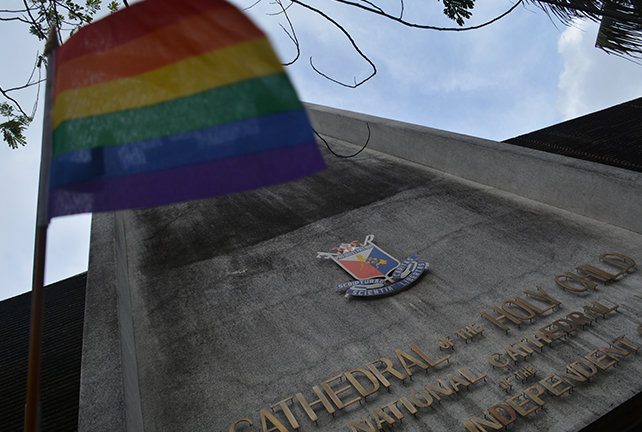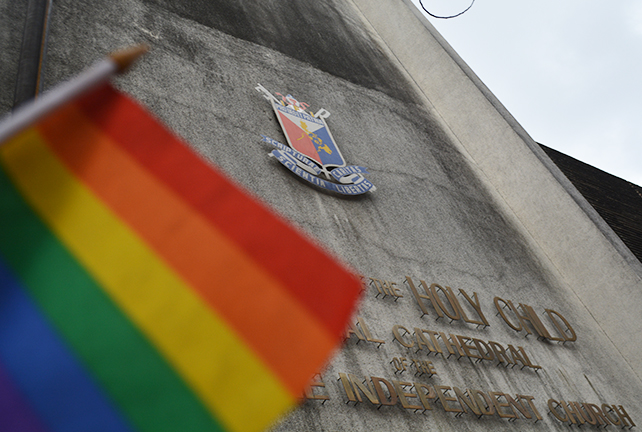The Iglesia Filipina Independiente (IFI; or the Philippine Independent Church) “humbly” asked for forgiveness from the LGBT community in a pro-LGBT statement that admitted that the church has, for many times, “shown indifference, and have made the LGBTIQ+ people feel less human, discriminated against and stigmatized. We apologize for instances they felt that, through our thoughts, words and deeds, God’s love is selective.”
IFI – also known as the Aglipayan Church – is an independent Christian denomination in the Philippines. It was established in 1902 by members of the Unión Obrera Democrática Filipina due to the mistreatment of the Filipinos by Spanish priests and the execution of José Rizal during Spanish colonial rule. Today, Aglipayans number at least six to eight million, with most of the church members coming from the northern part of Luzon, especially in the Ilocos Region and in the parts of Visayas like the provinces of Antique, Iloilo and Guimaras. There are also congregations in North America, Europe, Middle East and Asia. IFI is currently the second largest single Christian denomination in the country after the Roman Catholic Church, comprising approximately 2.6% of the total population of the Philippines.
The IFI statement – dubbed “Our Common Humanity, Our Shared Dignity” – stresses the church’s position that it “must openly embrace God’s people of all sexes, sexual orientations, gender identities and expressions as we embark on a journey toward a just and peaceful world.” This is because “the core message of peace and justice in Jesus’ life lead us in taking this humble step to give objective recognition to LGBTIQ+ individuals, and promote their dignity and rights as human persons.”
According to Vaughn Geuseppe Alviar, moderator of IFI Bahaghari Conversations and gender desk focal person of IFI, the church took four drafts in over one year before the IFI Supreme Council of Bishops approved the statement this February 2017.
But “the groundswell is far older,” he said to Outrage Magazine. Over a decade ago, LGBT individuals — mostly gay men and transgender women — already tried getting themselves recognized as a lay sector added to the church’s sectors for youth, women and laymen. Then, in a General Assembly in 2014, a gay man articulated during the plenary his query about the church’s plans for sexual minorities. This led to the discussions among the newly elected set of national youth officers, led by an openly gay president and a lesbian executive vice president (they are now succeeded by another openly gay president). Eventually, the “Our Common Humanity, Our Shared Dignity” was developed, approved and released as IFI’s official position on the LGBT community.
In attempting to be even more inclusive, the statement changed the “preferred term from LGBT to LGBTIQ+,” said Alviar, even if the emphasis “stayed with the struggle to human rights, which the Church is passionate about.”
While the “Our Common Humanity, Our Shared Dignity” has been considered a “brave statement”, Alviar said that “it came as a shock for conservatives, as much as woman priesthood in the IFI did two decades ago; to date, there is a still considerable resistance to this. I don’t think they saw this one coming.”
But Alviar said that “we recognize that the hostility against LGBTIQ+ individuals is centuries-old, and people and their parents before them have only known what the Bible says on the surface: That there was man, and from him the woman, nothing in between. There are the clobber passages that come into focus yearly because of the Holy Week celebrations.”
To deal with this hostility, IFI now holds dialogues — through talks, liturgies and fora — to provide avenues for interaction with members of the sexual minorities.

According to Vaughn Geuseppe Alviar, moderator of IFI Bahaghari Conversations and gender desk focal person of IFI, the church took four drafts in over one year before the IFI Supreme Council of Bishops approved the statement this February 2017.
There are also numerous other efforts made to popularize the “Our Common Humanity, Our Shared Dignity” statement.
For instance, IFI published the prayer (included in the statement) so it would be easier to include the LGBTIQ+ concerns in liturgies. IFI also used #SimbahangMalaya as its official hashtag as it, particularly, tries to appeal to the youth. IFI also joins and promotes activities that can introduce the church’s historic step to the general public, like Pride marches, HIV and AIDS-related activities such as free rapid screenings, and condom distribution, among others.
Better yet, there is now “systemic integration” in IFI, with the creation of a “Gender Desk” to lobby for LGBT inclusion, and to address issues arising from the statement. Similarly, “we supplement the initiative with parallel development programs, such as holding more ‘Bahaghari Conversations’ across the Philippines to provide safe spaces for LGBTIQ+ individuals and allies. We see these as an opportunity to make a Bahaghari Collective.”
In the end, Alviar said that the goal is to “make people see that LGBTIQ+ individuals are (also) people, and that their issues are a facet of human rights and dignity. We make them realize the power of love according to the Holy Book.”

The Aglipayan statement – dubbed “Our Common Humanity, Our Shared Dignity” – stresses the church’s position that it “must openly embrace God’s people of all sexes, sexual orientations, gender identities and expressions as we embark on a journey toward a just and peaceful world.” This is because “the core message of peace and justice in Jesus’ life lead us in taking this humble step to give objective recognition to LGBTIQ+ individuals, and promote their dignity and rights as human persons.”
The complete IFI statement reads:
OUR COMMON HUMANITY, OUR SHARED DIGNITY
“In Christ Jesus you are all children of God through faith.” (Galatians 3:26)
As we gathered to study and pray, we, the Supreme Council of Bishops of the Iglesia Filipina Independiente, strived to find unity in our Christian faith and to discover new ways to make the Church more reflective of God’s universal, unconditional love; more reflective of the nurturing and complementing diversity within the mystery of the Triune God.
The Church’s vocation is to live out God’s boundless truth (Acts 13:47); her mission to make the world a more just and joyous place for all (Isaiah 1:17). Constantly needing renewal, the Church always works to reform herself through the inspiration of God’s Spirit, so as to enable herself in a more effective way in bringing the Gospel of Christ to its own communities and the wider society.
Faithfulness to God’s mission requires that sincere efforts be made to see that justice is done for God’s people as the Iglesia Filipina Independiente engages herself in and confronts the challenges of our present generation. Enlightened by the Scriptures, the Church has been vigilant against unjust systems, confronting racism, slavery and sexism within and without, in a continuous process of theological reflection and pastoral engagement. Continually following the Spirit’s inspiration in history, our Church has joyfully affirmed the gift of women priesthood as part of the life-giving mission of Christ three decades ago.
Now, we are confronted by the universal challenge to stand on individuals who are lesbian, gay, bisexual, transgender, intersex, queer/questioning and who identify with the other sexual minorities, also known as LGBTIQ+.
We believe that the Church must openly embrace God’s people of all sexes, sexual orientations, gender identities and expressions (SSOGIE) as we embark on a journey toward a just and peaceful world. God’s love and compassion, and the core message of peace and justice in Jesus’ life, lead us in taking this humble step to give objective recognition to LGBTIQ+ individuals, and promote their dignity and rights as human persons.
Seeking to incarnate the rich message and meaning of God’s Word in our generation, the Church upholds the revolutionary reading of the Scriptures as she endeavors to keep herself unstained from the world (James 1:27) and worldly prejudices (James 4:12). We uphold the rich treasure of human sexuality being brought to light in our present generation.
Thus, we reaffirm our commitment to proclaim the Gospel to all the world so that people, of all SSOGIE, may receive God’s grace through faith in Christ (Galatians 3:26-29). Conforming to God’s design for His grace to freely flow to all people, we hope to break down the walls of stigma and prejudice within the Church.
Our Church proclaims the universality of God’s love. Our God is love (1 John 4:8;16), not hate and hostility; and love is a mighty force (1 Corinthians 13:13). We follow the footsteps of Jesus, who embraced all people with equal love, respect and compassion (Luke 4:18-19) and who extended his friendship to LGBTIQ+ individuals (Matthew 8:5-13).
We recognize and rejoice in the presence of the LGBTIQ+ community amongst us. We applaud their persistent belief in God’s embracing love. The judgment, intolerance and non-acceptance have not stopped many from serving the Church, even through the priestly order. They have enriched the life, work and witness of the Iglesia Filipina Independiente.
We humbly ask for forgiveness for the many times we have shown indifference, and have made the LGBTIQ+ people feel less human, discriminated against and stigmatized. We apologize for instances they felt that, through our thoughts, words and deeds, God’s love is selective.
The Gospel teaches us to live in love (Ephesians 5:2), to live out love (1 John 3:18), to offer love to each other (John 13:34). It instructs us to love God through the oppressed (Matthew 25: 34-40); to love other people as we would ourselves (Hebrew 13:1-3). We are told to cast out fear with perfect love (1 John 4:18). The greatest expression of love is liberation (James 1:25), especially for the Iglesia Filipina Independiente, who was given birth by the Filipino people’s struggle against historical injustice and inequality. We steadfastly hold on to our historic heritage in proclaiming Jesus’ message for the marginalized.
We offer our Church as a community where LGBTIQ+ people can freely and responsibly express themselves. With them, we pronounce God’s all-inclusive love. Being God’s children, LGBTIQ+ individuals are imbued with God’s gift of human dignity. The discrimination against them is part of the struggle for human rights. The Church affirms that LGBTIQ+ individuals have all the right to love and be loved, and commits to offer them opportunities to realize their full potential and dignity as human persons, as God’s children.
LGBTIQ+ individuals are called to give witness to our faith through living an exemplary Christian life. To become bearers of God’s compassion and charity in the world, they are exhorted by the Church, as all faithful, to abide by Article of Religion 12: “Holiness, altruism, obedience to God’s Commandments, and a zeal for His honor and glory are incumbent upon Clergy and Laity alike, therefore all should be trained in a clean and disciplined life, not neglecting prayer, study, and the exercise of moral discipline.”
The Iglesia Filipina Independiente offers herself as a welcoming Church for LGBTIQ+ persons. We commit our local churches and communities to LGBTIQ+-affirming ministries. We celebrate God’s grace through the Sacraments, and are grateful for God who does not discriminate anyone from receiving His grace in the Sacraments.
We believe God’s love is both encompassing and supreme, and that we must strive to share the same to the world. We pray for God to make the Church a continuing testament of his motherly love (Matthew 23:37). We, your bishops, offer our hands and warm embrace in Christian friendship (John 15:13) to LGBTIQ+ persons, so they may celebrate their gifts and calling, and fully and responsibly express themselves through the Iglesia Filipina Independiente.
We hope this move can effect change among Churches and church people. Through this declaration, we implore agenda-setters to discuss laws and initiatives challenging LGBTIQ+ discrimination. Only through this can we truly protect our brothers and sisters in the community, against issues such as abuse and the rise in HIV and AIDS cases in the sector; against avoidable fear, suffering and caution.
Our collective existence as human beings, our shared aspiration and struggle for a just and peaceful world, our common humanity, tell us that we are not at all different from LGBTIQ+ persons.
With this statement, we publish a prayer for equality:
Our Creator God, who intended the diversity of Creation, we come to you now with all humility. In your image, you blessed us with equal dignity, but we’ve imposed our own inequalities. We have scarred your Order, in which all are free, in which all matter despite sex, sexual orientation, gender identity and expression. Allow us to see beyond our persistent traditions and biases; our hurtful hate and suspicion. May we see your vision, where all are equal in the pursuit of your abundant blessings. Reveal to us our common humanity, our shared dignity; make crumble our many walls with our united wills. Send us with passion and strength to mend the world divided, so that it may transform into your unified reign of peace based on justice. All this we seek in the name of Jesus Christ, our Lord and Savior. Amen.
SGD:
Rt. Rev. Antonio Ablon
Secretary
Supreme Council of Bishops
Rt. Rev. Rhee Timbang
Chairperson
Supreme Council of Bishops
Most Rev Ephraim Fajutagana
Obispo Maximo
Iglesia Filipina Independiente



































































